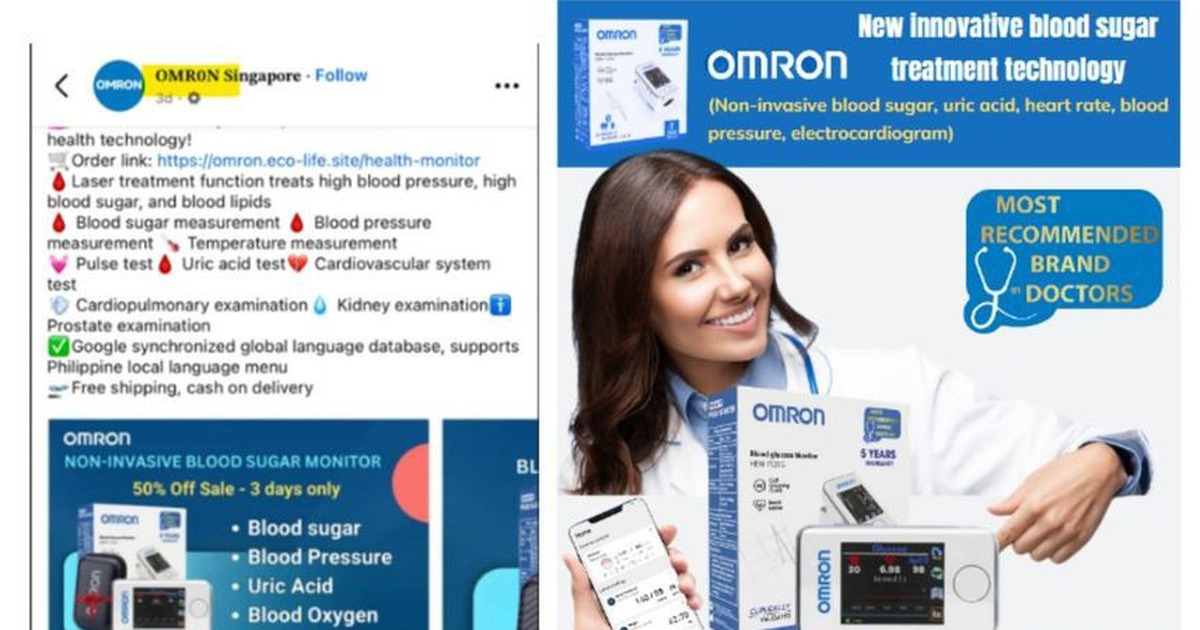Omron advises consumers to buy genuine products and avoid fake advertisements on social networks
Sheet The Straits Times January 5 reported that many famous Japanese brands, from Canon to Meiji, are warning domestic and foreign consumers to be wary of counterfeit goods, amid an increase in counterfeit goods advertised on social networks. or major e-commerce platforms.
These items are often promoted through fake social media ads, offering bargain prices or limited-time sales, with a link to a fake website when buyers click. . In addition, some merchants have taken advantage of the lax inspection of e-commerce platforms to sell counterfeit goods.
Companies say if a price appears too good it could be a fake, with many warning about the health risks of using or consuming counterfeit products.
Counterfeit goods have been a long-standing problem, but are becoming more sophisticated. The problem is so widespread that Japanese counterfeit goods have appeared in many other markets in Asia.
Omron, a maker of health monitoring devices like blood pressure monitors, was one of the companies hardest hit. The company was named, along with headphone brand Ambie, in an August 2024 circular by Japan’s Consumer Protection Agency, following a series of complaints from domestic consumers who had unwittingly purchased must be fake.
These consumers purchased counterfeit goods at huge discounts, fooled by the use of official brand logos into believing the products were genuine. However, consumers made purchases from websites not affiliated with Omron.
An Omron spokesman said counterfeit goods also appear abroad and the company receives about 150 complaints monthly, with the Philippines market being the most affected in the region.
“For every genuine Omron blood pressure monitor sold on e-commerce sites in the Philippines, there are 1.23 fake ones sold. This means there are more fake products than real products,” according to the above spokesperson. The spokesman said many other markets in Southeast Asia were also affected.
Recommendations and litigation
In September 2024, household appliance manufacturer Lixil declared war on counterfeit water purifiers, announcing it would sue anyone who infringes intellectual property rights.
This happened after many warnings failed to stop the spread of counterfeit goods. As Lixil claims, counterfeit goods “not only betray customers’ expectations and trust in the product, but also have the potential to endanger safety.”
Canon took legal action in the US when it filed a trademark infringement lawsuit in Washington on December 3, 2024 against 18 retailers accused of selling counterfeit Canon-brand printer ink cartridges.
Sports equipment manufacturer Yonex said counterfeit goods are increasingly sophisticated and “difficult to distinguish from genuine goods just by appearance”.
“But not only do they differ in specifications and performance from genuine products, but they are also inferior in quality and safety, posing a risk of injury or accident,” Yonex said in an advisory for to consumers, adding that they recommend purchasing from trusted retailers.
Meiji, which offers a wide range of dairy, confectionery and other products, said in September 2024 that it was stepping up efforts to protect the company’s trademark on its popular chocolate Kinoko no. Yama, made in the shape of small mushrooms and sold abroad.
“If we do not exercise our rights, we will not be able to maintain our brand value,” a Meiji representative said.
When all of the above measures fail, the government hopes consumers will be more vigilant.
“Counterfeiters have no ethics. If they think they can make money, they will not hesitate to sell your important personal information. Your name, address, phone number and card number can be misused,” the Japanese Patent Office warned.








